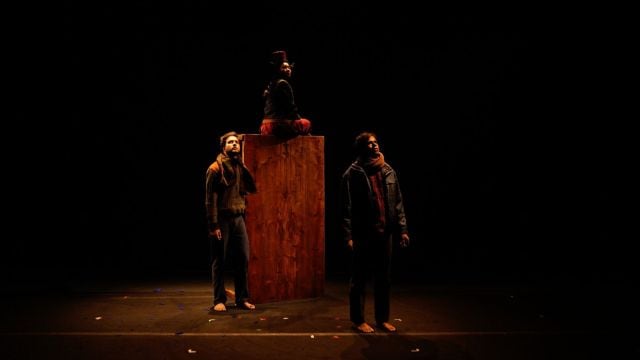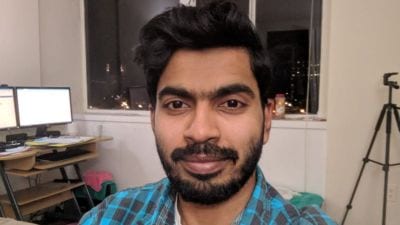IHC theatre festival is back: 14 productions, 10 days, and stories that shape the present
The festival, which starts on September 19, opens with Amitesh Grover’s Mehroon at 7 pm
 During the rehearsals of Jyoti Dogra's directorial Mezok, which will be staged on September 24. (Express Photo)
During the rehearsals of Jyoti Dogra's directorial Mezok, which will be staged on September 24. (Express Photo)Over the next 10 days, 14 productions will take the spotlight at the India Habitat Centre (IHC) — each grappling with questions that shape our present: from gender and caste to migration, the blurred edges of desire and memory, and the quiet introspection of one’s behaviour.
The stage is set once again, as IHC’s annual theatre festival opens on September 19.
The festival opens with Amitesh Grover’s Mehroon at 7 pm on Friday at the Stein Auditorium.
Written by Sarah Mariam, the play is a musical tale of desire, longing and love. A grieving woman attempts to start life again, after having lost everything, with a handful of wet earth and an innate gift to make her creations come alive. As the play moves forward, the audience will witness the shifting of her inner landscape, where mourning and imagination entangle.
“The title, Mehroon, is a colloquial word for the colour maroon. It returns as not only a motif but also a metaphor, symbolising both a sense of loss and grief but also a sense of longing, longing for love,” explains Grover.
At the heart of the play is its writer, Sarah Mariam, who drew from her personal reflections on love and loss. Grover describes their working equation as deeply collaborative. He says, “She began with a short story that she later developed into a full-length play.”
Jyoti Dogra’s Mezok, which will be staged on September 24 at the Stein Auditorium, is another much-anticipated play. The title refers to a fictional mountain, but the play itself revolves around the universal human pull towards a “better life”. Through the stories of a mall watchman rendered invisible in Mumbai or a taxi driver living vicariously in Canada, Mezok stages migration as both geography and yearning.
The play was created through 52 days of improvisation with six actors and a massive 120 kg table. In the play, the table is more than a prop — it is a co-actor shaping the story and the way the story is narrated. Dogra recalls the process, “We started with nothing. Just a table and six actors, with my manager, Sachin Kamani, with us through every step.”
Dogra recalls working with a table for the first time in Japan, around 2014. Since then, she has been fascinated by how the way in which everyday objects are used alters the way a person behaves. She said, “It’s not about how one can use the table, it’s about how the table changes you, inhabits you.”
During the 52 days of creating the play, she asked her actors to think of the table as an extension of each other. “As they started inhabiting the table, it changed the material and emotional spaces that they explored,” she explains.
On September 27, Vijay Ashok Sharma’s Besharam Aadmi will take the stage with Amol Parashar as the solo lead. Rooted in a personal anecdote, the play follows the story of a newly married man who believes in equality at home — until his parents visit, and he is confronted with the discomfort of handling his wife’s lingerie in front of them. That pause becomes the spark for thought-provoking introspection and inward spiraling of questions.
Sharma explains, “I firmly believe that something deeply personal is also universal. The whole play is about a man verbalising his thought process about why he hesitated despite being progressive and empathetic.”
The humour slips into moments of vulnerability, inviting audiences to reflect. On collaborating with Parashar for the play, Sharma says, “The first name that came to my mind was Amol’s. Our thought processes align on one thing: we want to tell stories that are humorous but slip in ‘taste of a truth’ when the guards are down.”
 During the rehearsals of Jyoti Dogra’s directorial Mezok, which will be staged on September 24. (Express Photo)
During the rehearsals of Jyoti Dogra’s directorial Mezok, which will be staged on September 24. (Express Photo)
Beyond these three plays, the festival offers a diverse roster: Kadambari (September 20) reimagines the life of Kadambari Devi, Khichik (September 22) explores a fractured relationship through different stages of life, Dagad Ani Mati (September 26) reflects on land and identity, while 305 Galli Mantola (September 28) captures Old Delhi’s fading community clinging to their history even as the world around them changes.
Plays like Aunty Moxie is Delulu (September 20), Garam Roti (September 21), Nazar Ke Saamne (September 27) and Lifafiya (September 28) — add further texture to the lineup.
With its range of plays — from abstract to the intimate — IHC Theatre Festival 2025 promises not just performances to the audience, but conversations that linger long after the curtain has fallen.







